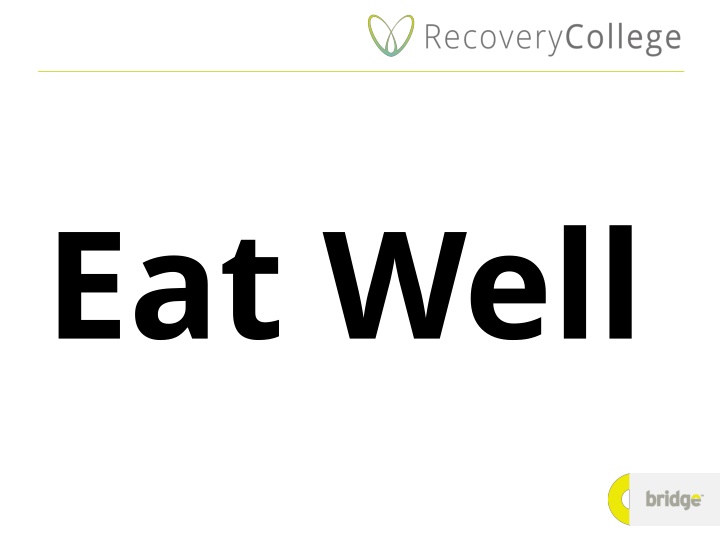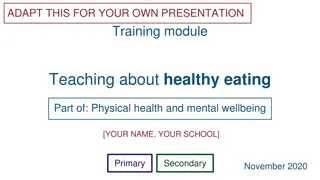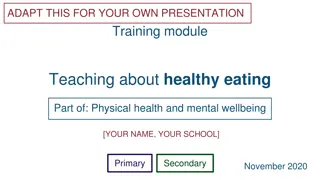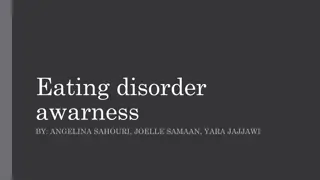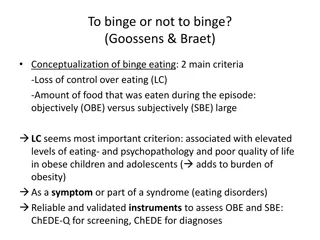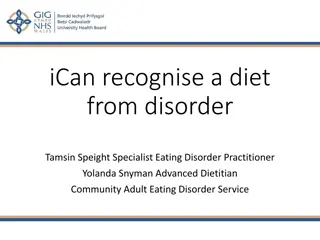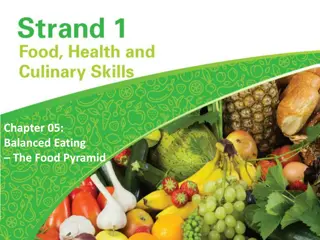The Importance of Healthy Eating for Mental Well-Being
Eating well plays a crucial role in maintaining mental health. Nutrient-dense foods can improve mood, cognitive function, and energy levels. Building healthy eating habits, identifying barriers, and addressing emotional eating are keys to achieving overall well-being.
Download Presentation

Please find below an Image/Link to download the presentation.
The content on the website is provided AS IS for your information and personal use only. It may not be sold, licensed, or shared on other websites without obtaining consent from the author.If you encounter any issues during the download, it is possible that the publisher has removed the file from their server.
You are allowed to download the files provided on this website for personal or commercial use, subject to the condition that they are used lawfully. All files are the property of their respective owners.
The content on the website is provided AS IS for your information and personal use only. It may not be sold, licensed, or shared on other websites without obtaining consent from the author.
E N D
Presentation Transcript
Eating well in a recovery context Eating well is part of a healthy lifestyle. Healthy eating practices can improve your mental health. We are what we eat. Unfortunately, many of the foods we eat today are over-processed, contain chemicals and preservatives, and lack nutrients. The gut is often referred to as the second brain. It is estimated about 90% of serotonin (the happy hormone) is made in the gut. The ability to concentrate and focus comes from the adequate supply of energy from blood glucose to the brain. In fact, the brain uses 20% of all energy needed by the body.
Food and Mood Consistent meals and mealtimes Skipping meals = low energy Blood sugar fluctuations = mood swings Regularly eating breakfast = maintains a healthy body weight The importance of carbohydrates Carbohydrates produce serotonin Keeping hydrated Improves cognition, mood and quality of sleep
Coping with emotions Emotional eating is triggered by feelings, and we may not realise we are using food to deal with our emotions. Next time you feel the urge to eat, ask yourself: Am I physically hungry? Tell yourself you can eat but wait 5 minutes to check your feelings. If you are still physically hungry, honour your feelings. What am I feeling? This can be difficult to answer. Are you feeling angry, bored, anxious, depressed, nervous etc.? What do you really need? Something to drink, a rest, to meditate, comfort, to express feelings etc.? Try trading actions for food.
Identifying barriers to lifestyle changes Identifying your individual barriers to healthy eating is the first step to creating strategies in order to overcome them. Which barriers in the table below, apply most to you? Lack of self-motivation to cook Busy schedule Drinking lots of high calorie beverages Lack of time to prepare meals Eating fast food often Frequently eating high calorie desserts Eating late (after 8pm) Eating quickly Eating large portion sizes Snacking often/mindless snacking Competing priorities Cost of healthy food Too great a change from current diet Other:
Identity based habits (James Clear) People who incorporate their personal goals into their sense of self are more likely to engage in goal consistent behaviour. Frame your health goal as part of your identity. Imagining yourself as a healthy eater is the key to changing your behaviour. For example, tell yourself, I am the type of person who leads a healthy lifestyle.
List boundaries you might set with yourself Setting simple boundaries can be helpful in establishing and maintaining a balanced relationship with food. Examples: Drink a glass of water first thing. Only buy what s on your shopping list (i.e. no impulse buys). Eating out no more than twice a week. Limiting yourself to one or two cups of coffee a day. Give up sugar in tea and coffee. No caffeine after 2pm. Drink at least 2 litres of water a day. Ration your snacks and put your snacks for a day in a box. Eat to feel satisfied. No eating after 9pm. Every week, give yourself the simple goal to buy at least one vegetable or other ingredient you don t usually eat.
